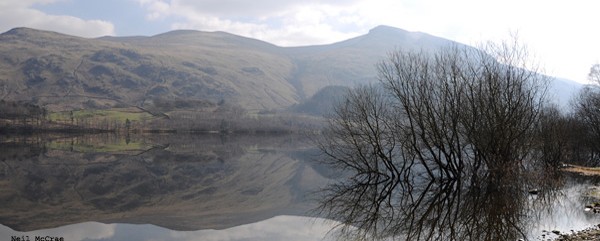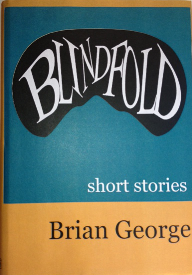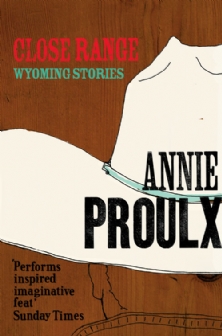
photo by Neil McCrae
Landscape as Metaphor in Brian George’s ‘More Than A Magician’
by Juliet West
First, an admission: I rarely re-read short stories. There are so many uncharted stories still to discover, it feels almost indulgent to dwell on particular favourites when I could be enjoying something new.
Occasionally, however, I can’t resist. ‘More Than a Magician’ by Brian George is one of those short stories which I found impossible to digest after just one bite. I needed to read it again and again, to savour the layers of metaphor, to understand how this brief portrait of a lonely man tending his garden could create such a fierce combination of intrigue, revelation and pathos.
 The work of Brian George – a contemporary Welsh writer – is widely-respected but not particularly well known. I first encountered his writing on a literary forum and decided to buy his second book, Blindfold, which was published in 2011 by Stonebridge Books. It’s a beautiful collection of short fiction: wistful, wise, and at times very funny.
The work of Brian George – a contemporary Welsh writer – is widely-respected but not particularly well known. I first encountered his writing on a literary forum and decided to buy his second book, Blindfold, which was published in 2011 by Stonebridge Books. It’s a beautiful collection of short fiction: wistful, wise, and at times very funny.
‘More Than a Magician’ is a one-page flash which appears mid-way through the collection. It opens like this:
Quiet in the garden, but no peace. Mac steps hard on his shovel,
gritting his teeth, but all he gets from the soil these days is a swarm
of dust.
‘These days’ – two short words which create a tight ball of tension. As a reader, I’m already hooked. I want to know what happened before ‘these days’ descended.
By the third paragraph, an answer begins to emerge: ‘He looks behind him, up to the bedroom window. Absence stares back at him, a dusty space where Kathy should be.’ Whether Kathy has moved away or died is unclear at this stage, but Mac’s world is undoubtedly barren.
In its quiet description of grief and loneliness, the prose echoes Thomas Hardy’s poem ‘The Going’, written after the death of his first wife, Emma.
Why do you make me leave the house
And think for a breath it is you I see
At the end of the alley of bending boughs
Where so often at dusk you used to be;
The haunting atmosphere in Hardy’s poem, as in George’s story, casts an ethereal shadow. The tone is elegiac, slow-paced. But when, suddenly, the landscape shifts, moving from the domestic (the garden, the bedroom window, the alley) to the dramatic, the mood becomes more intense, almost muscular. Mac looks up from his dusty garden towards the peak of a mountain, while Hardy remembers his late wife as a young woman on a Cornish clifftop, riding ‘along the beetling Beeny Crest’. This sudden change of perspective lifts the narrative in both pieces of work to an exhilarating new level. George writes:
Away to the north he can see the mountain, its peak snapped in two
seen from this angle. Ysgyryd. He can’t remember what the word
means now, but the sound of it makes him think of clashing. Of
fragments.
Ysgyryd. The thing he did, that little summer of deceit which sent
Kathy spinning round, turning her face from him for good.
 George’s use of landscape as metaphor is brilliantly effective. I love, too, the name of the mountain. I don’t speak Welsh, but in my mind ‘Ysgyryd’ is a forceful word, the hard syllables are spiky counterparts – a reminder of the power of place names in fiction.
George’s use of landscape as metaphor is brilliantly effective. I love, too, the name of the mountain. I don’t speak Welsh, but in my mind ‘Ysgyryd’ is a forceful word, the hard syllables are spiky counterparts – a reminder of the power of place names in fiction.
The description of the mountain foreshadows Mac’s confession – a searing, honest confession which is unaccountably moving. It would be easy to lose sympathy with Mac, given his apparent infidelity, his ‘little summer of deceit’. But, for this reader at least, judgement is suspended – there’s something about the framing of this story, the clashing mountain peaks and the dry soil, that reminds us of our fallibility as human beings.
For me, the natural setting of ‘More Than a Magician’ is key to the story’s success. Relationships, especially struggling relationships, will always provide rich literary material. But to chronicle a relationship within the context of a striking natural landscape somehow makes the struggle more profound.
There are two obvious comparisons: Ernest Hemingway’s ‘Hills Like White Elephants’ and Annie Proulx’s ‘Brokeback Mountain.’ In these celebrated short stories, the hills and the mountain represent a primal kind of freedom. They provide a vast, wild perspective from which we are able to view small man-made tragedies.
At the end of George’s ‘More Than a Magician’ there is no epiphany, no resolution or transformation (those supposed stock ingredients of a Good Story). Rather, there is a sense of stagnation and resignation. Yet stagnation turns out to be a powerful denouement.
He pulls his packet of seeds from his pocket. He wipes the sweat
from his face with the back of his hand, then sprinkles a few seeds
over the ground. They lie there. Sterile. Safe from the birds which no
longer come.
Interestingly, Hemingway and Proulx’s stories also end on a note of resignation: a closing down of the problem. Hemingway’s story, set in a railway station close to a hill range, is told largely in dialogue. A man and a woman are discussing an operation (an abortion, we assume, although this is never actually stated). The conversation reaches a narrative stalemate and the story finishes with the woman, Jig, telling her lover: “I feel fine. There’s nothing wrong with me. I feel fine.” While ‘Brokeback Mountain’ ends with a heartbreakingly understated sentence describing Ennis’s grief for Jack, his dead lover.
There was some open space between what he knew and what he
tried to believe, but nothing could be done about it, and if you can’t
fix it you’ve got to stand it.
 The topographical and thematic similarities between these three stories – and Hardy’s poem – may just be co-incidence. But I feel that there is more than co-incidence at work. It’s clear that the mountains or the hills or the clifftop symbolise wilderness and freedom, but they’re also something immoveable, part of the landscape which cannot be changed. In the same way, these stories portray characters whose problems seem insurmountable. As Hardy wrote in ‘The Going’: ‘Well, well! All’s past amend,/Unchangeable.’
The topographical and thematic similarities between these three stories – and Hardy’s poem – may just be co-incidence. But I feel that there is more than co-incidence at work. It’s clear that the mountains or the hills or the clifftop symbolise wilderness and freedom, but they’re also something immoveable, part of the landscape which cannot be changed. In the same way, these stories portray characters whose problems seem insurmountable. As Hardy wrote in ‘The Going’: ‘Well, well! All’s past amend,/Unchangeable.’
Most writers are intensely aware of their natural surroundings, and so I believe this kind of symbolism is employed on a subconscious level, not shoe-horned in as a deliberate conceit. But whether intentional or subconscious, the effect in ‘More Than a Magician’, and the other works discussed here, can be remarkable.
~
After submitting this feature, I learnt the sad news that Brian George died in September. Although I never met him, I know that Brian is remembered as an insightful, modest and inspiring man who was unflagging in his generosity and encouragement towards other writers. He has left a great legacy in the form of his two short story collections, Walking the Labyrinth (Stonebridge Books 2005) and Blindfold (Stonebridge Books 2011). Stonebridge is a small independent publisher based in Ebbw Vale, south Wales. To order books, contact anniwj.stonebridge@yahoo.ie


great article